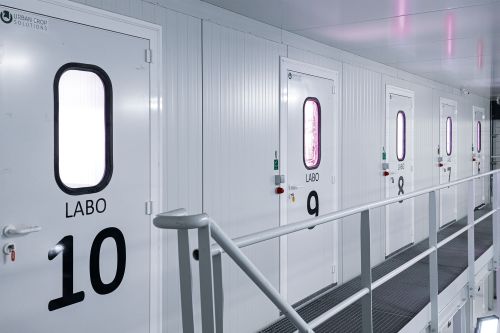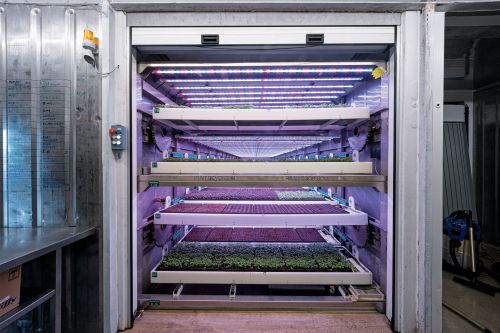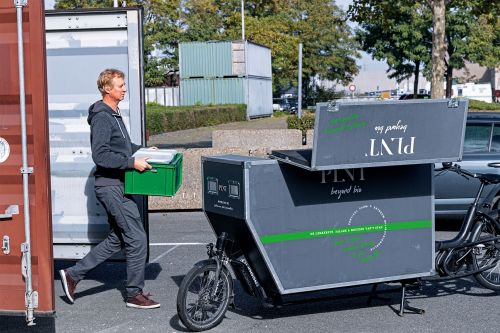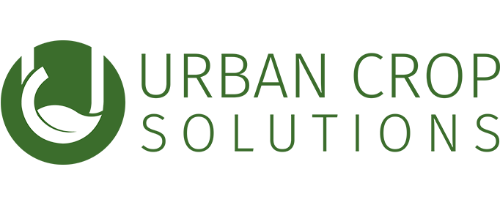End-to-end solutions for vertical indoor farming
How to (partially) feed 8 billion people
Urban Crop Solutions and PLNT are cutting supply chains with indoor farming.
On 15 November 2022 the time had come: The world population has officially passed the 8-billion mark and the trend is rising. Feeding humanity is a constantly growing challenge. Also, a challenge that innovative companies are increasingly taking on. Urban Crop Solutions with headquarters in Waregem, Belgium, is one of them.
“We see ourselves as an end-to-end solution provider for vertical indoor farming”, says Maarten Vandecruys, founder and CTO of Urban Crop Solutions. What this means in detail is that Urban Crop Solutions offers not only the technical hardware and software for optimised growing of plants, it also identifies in its own research centre each of the parameters that affect the growth of plants: temperature, light conditions, watering and fertilization. For optimum plant growth, the individual requirements must be determined and met exactly.
Only five per cent of conventional water consumption
If this is the case, indoor farming can be carried out extremely efficiently. “Plants can be grown with water consumption equivalent to five percent of the water consumed when growing plants conventionally. Plants can also be produced close to the end consumer, thereby further reducing stress on the environment. Finally, indoor farming can also be done without using pesticides, which increases the nutritional value of the product considerably”, says Vandecruys.


Picture 1: Urban Crop Solutions conducts plant research for the present and the future in its own laboratories. Picture 2: Researchers at Urban Crop Solutions identify the optimum parameters for efficient plant growth.
Indoor farming - scalable in three dimensions
With the “ModuleX”, Urban Crop Solutions offers the technical hardware required for efficient indoor farming.
“The ModuleX is the current development level of our vertical indoor farming solution”, says Vandecruys.
The basic principle: The plants are moved around in transport benches on two levels by a carousel system under LED lighting and a watering system. A total of 64 of these benches provide space for plants with a growth height of up to 26 centimetres. The conceptual design can be scaled in all three dimensions depending on the need.
“Each unit remains a self-enclosed system by itself”, adds the founder of Urban Crop Solutions. “The advantage of this is that in the event of an infestation, for example, only one unit has to be treated. The rest of the plants would not be affected, and the loss of harvestable plants would thus be greatly reduced.”
High quality herbs and salads for Antwerp
One company that is successfully implementing the conceptual design of Urban Crop Solutions in a practical application is PLNT. The team working with co-founder Hans Snijder supplies local consumers with fresh salads and herbs from its location on the Antwerp harbour. “Our commitment is to produce and transport our products with the highest quality and maximum sustainability”, explains Snijder.
The customers: Antwerp households and restaurants that share exactly the same values. While private customers can receive deliveries of fresh salads with alternating varieties on a subscription plan, PLNT also produces for restaurants, catering to individual needs. Plants are usually selected and grown in close consultation with the restaurant’s head chef. Altogether PLNT grows about 35 different types of plants in the ModuleX for its subscribers.
Only what is actually in demand is produced
“Besides quality, quantity is also crucial for us. Of course, our zero-waste philosophy also includes our yield. We produce only the amount we know will cover the existing demand and not exceed it.” PLNT currently has a ModuleX in operation.
“Several factors drove our decision to choose the solution from Urban Crop Solutions”, explains Snijder. “First, the vertical scalability for us right here in Antwerp, where space is very rare and thus expensive, is an advantage for us. Second, we were impressed by the easy handling and high quality of the solution.”


Indoor farming, scalable in three dimensions: made possible by the ModuleX of Urban Crop Solutions.
Added value through quality down to fine details
To develop the ModuleX to the confirmed quality level, Urban Crop Solutions also chooses individual components with maximum quality and reliability, as confirmed by Project Manager Pieter-Jan Devos:
“We select each individual component ourselves to offer our customers the maximum added value with our complete solution.” The same applies to the sensor system, whose quality has a direct effect on the quality of the plants – and thus also on the operator’s yield and the profitability of indoor farming.
Process quality ensured by sensor system
A total of five critical points are monitored by the sensor system to guarantee efficient and reliable operation of the system for vertical indoor farming. An inductive sensor determines whether the door of the ModuleX is opened or closed.
“Of course, the automatic program should not be running as long as the door is open, for example, to harvest plants or place new seedlings in the benches”, says Devos. The position of the benches themselves is monitored by the sensor system. “If a bench is no longer correctly in place in the transport system, the plants and the entire system could be damaged, so it is important to make certain that the carousel is functioning flawlessly.”
Factors that determine plant quality: Quantity and temperature of the water
A flow meter measures the flow of water to ensure selective watering of the plants. “In this manner we can also determine whether the pump is functioning as required or whether maintenance is necessary”, explains Devos. Since the water temperature also affects growth and quality, it is continuously monitored by a temperature sensor. A level sensor also measures the water level in the tank.
“We recycle the water to minimize consumption. But of course, we still need to make sure there is enough water available at all times to prevent the plants from drying out.”
Conscious decision for ifm
“We made a very conscious decision in choosing ifm as our partner for the sensor system. The sensors have proven themselves in intensive tests and as of today we have never experienced a failure. But if we ever should be in the position of needing to replace a sensor in a customer’s system, we know we will receive replacement parts very quickly. And that’s not just here in Belgium, but everywhere in the world. We were impressed by this outstanding service in addition to the product quality.”



Picture 1: Sustainability as the overall concept: Antwerp company PLNT produces in worn-out sea containers, always only in quantities that are covered by local demand. Picture 2: Inductive sensors from ifm ensure safe and reliable transport processes in the ModuleX. Picture 3: Fill level, temperature, and flow rate – three factors that determine the quality of the plants – are monitored by ifm sensors.
Is vertical farming the future of the agricultural sector?
The product quality of plants grown in indoor farming is right – this is demonstrated by the popularity of PLNT’s offer. The company wants to expand and make the locally produced quality goods available in other urban centres as well. Hans Snijder gives his estimate of the situation: “Indoor farming in general is just getting started.
We see ourselves as pioneers – a role that suits us well. And even if the technology continues to improve, I don’t think indoor farming will replace traditional agriculture any time soon. It’s not efficient enough for that yet. And at least at our latitudes, the climate is still good enough to ensure successful crops and meet the basic demand using conventional methods.”
Maarten Vandecruys sees it the same way: “On the one hand, indoor farming will be a key element when it comes to shortening supply chains and producing healthy, nutritious food locally and thus independently of global trends. At the same time, we will also continue to need the traditional agricultural sector to cover the rising demand for food. Indoor farming can play a role here in growing seedlings, which can then be planted in the field. To ensure that plants provide a good yield even under increasingly stressful climatic conditions, we at Urban Crop Solutions are incorporating our know-how in research and development of more robust plant types for outdoor farming.”
Conclusion
With reliability and quality, ifm sensors contribute to efficient, economical indoor farming solutions.
They show their strengths in sustainable local supply, but in the future, they could also take on an important role in growing seedlings for traditional outdoor farming – and thus also in ensuring nutrition for the global population.
